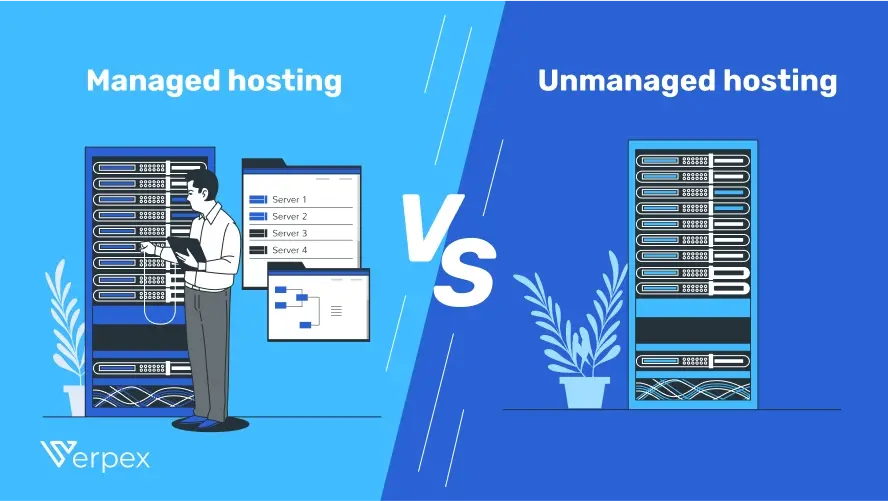Managed web hosting and unmanaged web hosting each have their benefits. But which one is right for you?
Choosing the right web hosting service is crucial for your website’s success. Managed web hosting offers a comprehensive solution where experts handle the technical details. This lets you focus on your business. Unmanaged web hosting, on the other hand, gives you more control and responsibility.
It’s like choosing between a serviced apartment and a DIY home. Understanding the differences can save you time and headaches. Let’s explore why managed web hosting might be the better choice for your needs.
Introduction To Web Hosting
Choosing the right web hosting can be a daunting task. It is crucial to understand the basics before diving into managed and unmanaged options. Let’s start with an introduction to web hosting.
Basic Concepts
Web hosting is a service that allows individuals or organizations to post a website or web page onto the Internet. A web host, or hosting service provider, is a business that provides the technologies and services needed for the website or webpage to be viewed on the Internet. Websites are hosted, or stored, on special computers called servers.
When users want to view your website, all they need to do is type your website address or domain into their browser. Their computer will then connect to your server and your webpages will be delivered to them through the browser.
Types Of Web Hosting
There are several types of web hosting services available. Each type meets different needs and budgets. The most common types include shared hosting, VPS hosting, dedicated hosting, and cloud hosting.
Shared hosting is the most basic type, where multiple websites share the same server resources. It’s cost-effective but offers limited control. VPS hosting stands for Virtual Private Server hosting. It provides more control and resources than shared hosting, by dividing a physical server into several virtual servers.
Dedicated hosting means you have an entire server to yourself. It offers high performance and control but at a higher cost. Cloud hosting uses multiple servers to balance the load and maximize uptime. It offers great scalability and reliability.
Understanding these basic concepts and types can help you make an informed decision about your web hosting needs.

Credit: www.greengeeks.com
Managed Web Hosting Overview
Managed web hosting simplifies website management by offering expert support and maintenance. It ensures better security, performance, and uptime. Choosing managed over unmanaged hosting means less hassle and more focus on growing your business.
Managed web hosting is a service where the hosting provider takes care of all server-related tasks. This means you don’t need to handle technical details. The hosting company manages everything for you. This includes server setup, maintenance, and security.
Features
Managed web hosting comes with several useful features. These include automatic backups and software updates. You also get advanced security measures. These keep your website safe from threats. Another feature is performance monitoring. The hosting provider ensures your site runs smoothly.
Advantages
There are many advantages to choosing managed web hosting. First, it saves time. You don’t need to spend hours on server management. Second, it provides peace of mind. Your hosting provider handles security and updates. Third, it offers expert support. If you have issues, help is available 24/7. Lastly, it ensures your site is always up-to-date and secure. “`
Unmanaged Web Hosting Overview
Unmanaged web hosting gives you control over your server. You handle all configurations and maintenance. This option suits experienced users. They manage their server needs and issues independently. Understand the features and disadvantages before deciding.
Features
Unmanaged web hosting offers full access to the server. Users can install any software. They can customize settings to fit their needs. It often comes at a lower cost. You only pay for the resources you use.
Disadvantages
Managing the server requires technical knowledge. Without it, you may face issues. Troubleshooting and security are your responsibility. You handle updates and backups. Any downtime falls on you to resolve. It can be time-consuming. Mistakes can lead to bigger problems.
Key Differences
Choosing between managed and unmanaged web hosting can be challenging. Understanding the key differences can help you make an informed decision. Below are the main distinctions to consider.
Support Level
Managed web hosting offers a higher level of support. Experts handle technical issues. They provide assistance around the clock. Managed hosting includes tasks like:
- Software updates
- Security monitoring
- Backups
Unmanaged hosting, on the other hand, provides minimal support. You are responsible for managing the server. This includes:
- Installing software
- Configuring settings
- Troubleshooting issues
If you lack technical skills, managed hosting is a safer choice.
Server Management
Managed hosting takes care of server management for you. Professionals ensure your server is always running smoothly. They handle:
- Server setup
- Performance optimization
- Security patches
With unmanaged hosting, you manage the server yourself. This requires:
- Technical expertise
- Time investment
- Regular maintenance
For those without server management skills, unmanaged hosting can be risky.
Here’s a table summarizing the key differences:
| Feature | Managed Hosting | Unmanaged Hosting |
|---|---|---|
| Support Level | High | Low |
| Server Management | Handled by experts | Handled by you |
| Technical Expertise Needed | Minimal | High |
Understanding these differences can guide you to the best web hosting option for your needs.
Benefits Of Managed Hosting
Choosing managed web hosting over unmanaged options offers numerous benefits. These advantages make it an attractive choice for businesses and individuals alike. With managed hosting, users can focus on their core activities. The hosting provider handles the technical aspects. Let’s explore some key benefits of managed hosting.
Ease Of Use
Managed hosting is user-friendly. The provider takes care of server setup and maintenance. You don’t need technical expertise. They handle software updates, backups, and monitoring. This ensures your website runs smoothly. You can save time and focus on your business. Managed hosting simplifies the process for everyone.
Enhanced Security
Security is a top priority in managed hosting. Providers offer advanced protection features. They monitor your website for threats. Regular updates and patches keep your site secure. Managed hosting includes firewalls, malware scans, and DDoS protection. This means your data stays safe. You can have peace of mind knowing your site is protected.

Credit: verpex.com
Challenges Of Unmanaged Hosting
Unmanaged web hosting can present significant challenges. These challenges often stem from the need for deep technical knowledge and the time required to maintain the server. Many website owners find these obstacles overwhelming.
Technical Expertise Required
Unmanaged hosting demands a high level of technical skill. You need to handle server setup, software installation, and security configurations. Without proper expertise, you risk server vulnerabilities and downtime. This can affect your website’s performance and security.
Time-consuming
Managing a server takes a lot of time. Regular updates, troubleshooting, and backups are necessary tasks. These tasks can be tedious and time-consuming. For busy website owners, this can be a significant burden. It can distract you from focusing on your core business activities.
Cost Comparison
Choosing between managed web hosting and unmanaged web hosting often comes down to costs. Both options have their pros and cons. But understanding the cost differences can help you make a better decision.
Initial Costs
Managed web hosting usually has higher initial costs. You pay for the extra services and support. This includes server setup, security, and regular maintenance. Unmanaged hosting, on the other hand, is cheaper upfront. You only pay for the server space and bandwidth. No extra services are included.
Long-term Costs
Managed hosting may seem expensive at first. But it can save you money over time. The ongoing support and maintenance help prevent costly issues. Unmanaged hosting can become more expensive in the long run. You need to pay for additional services and support. If something breaks, fixing it can be costly.

Credit: www.liquidweb.com
Who Should Choose Managed Hosting?
Managed web hosting provides many benefits. It offers a hassle-free experience. But who should choose managed hosting? Let’s explore.
Small Businesses
Small businesses often have limited resources. They may not have a dedicated IT team. Managed hosting can be a perfect fit. It allows businesses to focus on growth. Hosting providers handle technical tasks. This includes server maintenance and updates. This saves time and reduces stress.
Non-technical Users
Non-technical users often find web hosting complex. Managed hosting simplifies the process. The provider takes care of everything. This includes security, backups, and performance. Users can focus on their website content. They do not need to worry about technical issues. This makes managed hosting an ideal choice.
Who Might Prefer Unmanaged Hosting?
Choosing between managed and unmanaged web hosting depends on your needs and expertise. Managed hosting offers convenience, but some users may prefer unmanaged hosting. Let’s explore who might prefer unmanaged hosting and why it could be a better choice for them.
Large Enterprises
Large enterprises often have dedicated IT teams. These teams possess the skills to handle server management. They prefer unmanaged hosting for its flexibility. It allows them to customize server settings to match their needs. This level of control is essential for their complex operations.
Tech-savvy Users
Tech-savvy users enjoy the challenge of managing their own servers. They have the knowledge to troubleshoot issues. Unmanaged hosting gives them the freedom to experiment. They can install custom software and optimize server performance. This hands-on approach is ideal for those who love technology.
Frequently Asked Questions
What Is Managed Web Hosting?
Managed web hosting is a service where the hosting provider handles server management tasks. This includes updates, security, backups, and performance monitoring. It allows website owners to focus on their business without worrying about technical issues.
How Does Unmanaged Hosting Differ?
Unmanaged hosting requires the user to handle all server management tasks. This includes setup, maintenance, security, and troubleshooting. It provides more control but requires technical expertise and time investment.
Why Is Managed Hosting More Secure?
Managed hosting offers enhanced security features like regular updates, monitoring, and backups. Hosting providers use advanced security measures to protect your website from threats. This reduces the risk of cyber attacks and data loss.
Is Managed Hosting Worth The Cost?
Managed hosting is worth the cost for businesses needing reliable performance and support. It saves time and reduces stress by handling technical tasks. The investment ensures your website runs smoothly and securely.
Conclusion
Choosing managed web hosting offers numerous benefits for users. It saves time and reduces stress. Managed hosting provides better security, support, and performance. Unmanaged hosting demands technical skills and constant maintenance. For most users, managed hosting is the smarter choice.
It allows focus on growing your website. Enjoy peace of mind knowing experts handle server issues. Managed hosting delivers a reliable, hassle-free experience. Make the switch today for a smoother web journey. Your website deserves the best care available.

